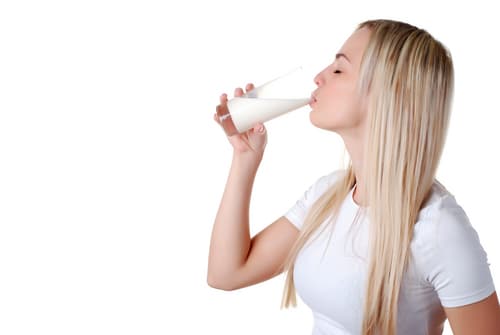 There are no supplements that will magically reduce body fat. The key to lowering body fat is still a clean diet of mostly whole foods and a balanced fitness plan that emphasizes both cardiovascular and strength-training exercise. So there’s no magic pill, but there is some evidence that certain dietary components as part of a well-balanced diet supports body fat loss. An example? Vitamin D and calcium. A study recently looked at the role these two vital dietary components play in slashing body fat.
There are no supplements that will magically reduce body fat. The key to lowering body fat is still a clean diet of mostly whole foods and a balanced fitness plan that emphasizes both cardiovascular and strength-training exercise. So there’s no magic pill, but there is some evidence that certain dietary components as part of a well-balanced diet supports body fat loss. An example? Vitamin D and calcium. A study recently looked at the role these two vital dietary components play in slashing body fat.
Vitamin D and Calcium: Can They Help You Shed Body Fat?
In this study, published in the Nutrition Journal, two groups of obese and overweight adults followed a calorie-restricted diet for 3 months. During this time, one group of adults took 600 milligrams of calcium and 125 international units of vitamin D3 a day while the other group didn’t. At the end of the 12-week study, both groups lost similar amounts of weight – but there was one significant difference. The group that supplemented with vitamin D3 and calcium daily lost more body fat.
This isn’t the first research to show that vitamin D and calcium can help to reduce body fat. In fact, other recent studies point to the benefits of calcium and vitamin D for people struggling to lose weight. How so? There’s some evidence that vitamin D influences fat cells, telling them when to burn fat and when to store it in all the spots you don’t want to see it – your tummy, hips, and thighs. Vitamin D also boosts calcium absorption from your intestinal tract, so this mighty duo works together to keep fat stores in check.
More Evidence Pointing to Calcium and Vitamin D
In a large study published in the Archives of Internal Medicine involving over 36,000 women, post-menopausal women who supplemented with 400 international units of calcium and 1,000 milligrams of calcium a day gained less weight over time. Keep in mind these women started out with relatively low calcium intake. Other research also supports the benefits of calcium and vitamin D for controlling weight gain and body fat. When your body doesn’t get enough calcium, it ramps up enzymes that store calories as body fat rather than burning them as fuel, according to a study published in the FASEB Journal.
The form of calcium you get is important too. The FASEB study found that dairy calcium from sources such as milk was better at reducing fat storage than calcium in the form of a supplement. This is consistent with other research showing a greater fat loss from diets higher in dairy products.
Getting enough calcium in your diet isn’t difficult if you eat dairy foods. A cup of yogurt has about 400 milligrams of calcium and a cup of milk 300 milligrams. It’s not hard to get 1,000 to 1,200 milligrams of calcium a day, the recommended amount, through diet with a little effort. Getting enough vitamin D through diet is more of a challenge. The best source of vitamin D is sunlight. When light strikes your skin, precursors on the surface of your skin are converted to intermediates that your liver and kidneys modify to make active vitamin D. If you get limited sun exposure or live in Northern latitudes where the sun is weaker, your risk of being vitamin D deficient goes up. In fact, some studies show that three out of four people are low or marginally low in vitamin D – and some experts believe this is contributing to the obesity epidemic.
Vitamin D: A Major Player in the Obesity Epidemic?
It’s too early to point the finger at low vitamin D levels as perpetrators in the obesity epidemic. Some research suggests that people who are obese are less able to convert vitamin D into its active form. But if you’re trying to lose body fat, it’s important to make sure you have enough vitamin D and calcium on board. The best way to get calcium is through diet, especially since it’s not clear at this point whether taking calcium supplements is safe. Research has shown a link between supplemental calcium and heart disease. Make sure you’re getting enough calcium-rich foods in your diet.
Getting enough vitamin D is more problematic, especially since the experts can’t agree on how much people really need per day. Most believe the amount currently recommended of 600 international units of day for adults under the age of 71 and 800 international units daily for adults over the age of 71 is still too low. The best way to see where you stand is to ask your doctor to do a blood test called the 25-OHD blood test to check your vitamin D levels. Once you know your level, you and your doctor can decide whether you need a vitamin D supplement and how much.
The Bottom Line?
Vitamin D and calcium are important not only for overall health – but they also seem to be important for controlling body weight. Make sure you’re getting enough.
References:
Nutraingredients.com. “Calcium Plus Vitamin D May Slash Body Fat Levels”
Arch. Intern. Med. 2007 May 14; 167(9): 893-902.
FASEB J. 2000 Jun;14(9):1132-8.
Harvard School of Public Health. “Vitamin D and Health”
WebMD. “Obesity Linked to Lower Vitamin D Levels”
Harvard Health Publications. “Link between calcium supplements and heart disease raises the question: Take them or toss them?”
Related Articles By Cathe:
Calcium Absorption: How Much Calcium Are You Actually Absorbing from the Food You Eat?

